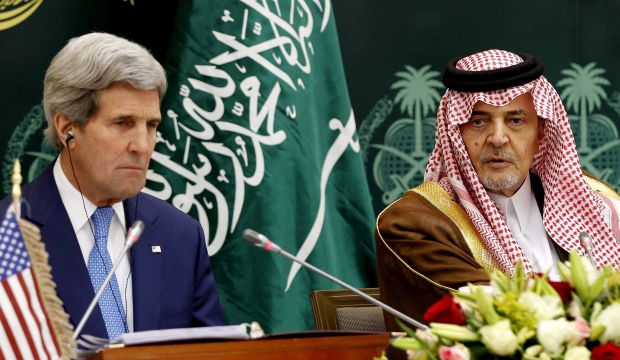
US Secretary of State John Kerry (L) and Saudi Arabia Foreign Minister Prince Saud Al-Faisal, give a press conference in Riyadh, Saudi Arabia, on March 5, 2015. (EPA/Ahmed Yosri)
Riyadh, Asharq Al-Awsat—US Secretary of State John Kerry visited Riyadh on Thursday to ease Saudi and Gulf concerns about an emerging nuclear deal with Iran, with Saudi Foreign Minister Prince Saud Al-Faisal characterizing the talks as “fruitful and constructive.”
Just one day after wrapping up the latest round of nuclear negotiations with Iran, Kerry visited the Saudi capital on Thursday to hold high-level discussions with the Saudi leadership, meeting with Custodian of the Two Holy Mosques King Salman Bin Abdulaziz.
Kerry also met with Gulf Cooperation Council (GCC) foreign ministers in the Saudi capital amid increased Arab concerns regarding Iran’s suspected pursuit of nuclear weapons and its expansionist ambitions in the region. The GCC has accused Tehran of backing Yemen’s Shi’ite Houthi militia, which Arab leaders have accused of carrying out a “coup” against legitimate President Abd Rabbuh Mansur Hadi.
Following the end of the talks, Saudi Foreign Minister Prince Saud Al-Faisal confirmed that the bilateral talks between Riyadh and Washington were “fruitful, constructive, in-depth, and transparent.”
“We examined a wide range of bilateral relations, issues, between our two countries, in addition to discussing the regional and international issues of mutual interest,” he said.
“The meeting explored the developments in Yemen, Syria, Libya, and the efforts of the international coalition for countering terrorism, in addition to the developments of talks on the Iranian nuclear program, the Middle East peace process, and other issues,” Prince Saud Al-Faisal added.
The Saudi foreign minister reiterated GCC and international condemnation of the Yemeni Houthi coup. “There is full international accord on rejecting the Houthi coup d’etat . . . and their endeavors to impose the status quo with force, including the so-called constitutional declaration by the Houthi militia. The international community expressed its full support to the legitimate government in Yemen led by President Abd Rabbuh Mansur Hadi.”
“This is clearly reflected in the statements issued by GCC, the Arab League, and the UN Security Council,” he added.
While US Secretary of State John Kerry reiterated the importance of US–Gulf ties to confront regional challenges. “President Obama and I know that partnerships with the Gulf nations are absolutely essential in meeting any number of urgent challenges. It’s critical that we therefore keep in very close touch, particularly at such a complicated time when there are so many moving pieces in so many different places,” he said.
He acknowledged the sensitive nature of the Iran nuclear talks, and said that he was seeking to reassure Riyadh and the Arab Gulf regarding the nature of the talks.
“A large part of why I wanted to come to Riyadh today is to update our Gulf partners on exactly where the negotiations stand, on what our standards are, on what we are looking to achieve, and what we have done since the talks first started. And let me underscore: We are not seeking a grand bargain; nothing will be different the day after this agreement if we were to reach one with respect to all the other issues that challenge us in this region, except that we will have taken steps to guarantee that Iran will not have a nuclear weapon. And that is a critical component of security for the region and for the world.”
“Preventing a nuclear-armed Iran will, as Prince Saud just said, address many of the concerns of the region. It will alleviate tension and remove barriers to regional security. It will reduce the pressure for a regional nuclear arms race, and it will increase the strength of the international nonproliferation regime. It will also vastly improve the prospects for peace both here and elsewhere,” he added.
Prince Saud Al-Faisal and John Kerry also discussed the ongoing war against the Islamic State of Iraq and Syria (ISIS), with both officials confirming their country’s commitment to the fight in Iraq and Syria.
“We have no higher priority than disrupting and defeating Daesh and other terror networks in order to give the people of Syria the chance that they deserve to recover and to build—rebuild their country,” Kerry said, using the Arabic acronym for ISIS.
While his Saudi counterpart affirmed that “We discussed the efforts of the international coalition to fight terrorism, and ISIS in particular, including the ongoing military efforts to fight the organization, the ongoing military security, intellectual, financial and media actions. Saudi Arabia underscores the importance of this coalition in fighting ISIS both in Iraq and Syria.”
